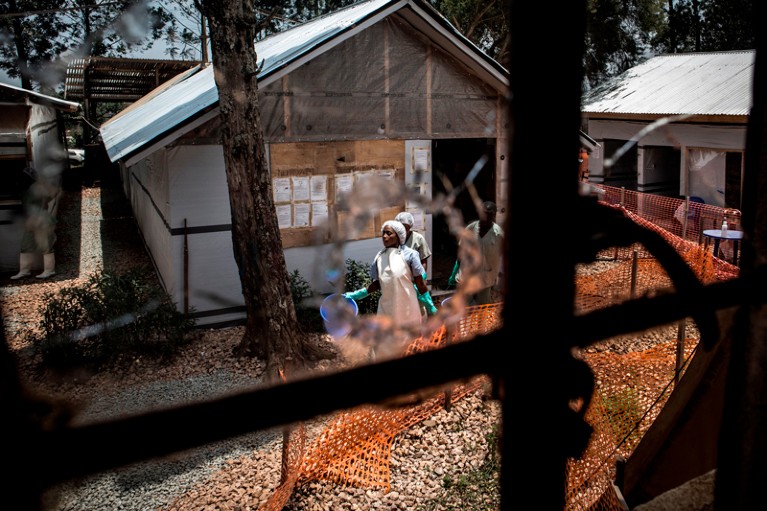
Health workers seen through a bullet hole in the window of an Ebola treatment centre in the Democratic Republic of the Congo.Credit: John Wessels/AFP/Getty
A disaster is quietly unfolding in the Democratic Republic of the Congo (DRC), where Ebola has infected nearly 1,000 people and killed more than 600. It is the second-largest outbreak of the disease — and epidemiologists worry that it will continue to grow because the virus could be spreading undetected. New cases are being diagnosed late, which means that the virus has ample time to spread.
Central to this problem is a lack of trust. Many people in the hard-hit northeastern province of North Kivu are not seeking care because they don’t think that those responding to the disaster will help and protect them. Responders and clinics are receiving death threats, assaults and attacks, and rumours are rife. When anthropologists conducted surveys in North Kivu between November 2018 and February 2019, many community members told them that they saw Ebola as a government scheme to marginalize people; that it was a business that profits aid workers, researchers and government officials; or that the government’s health system was unable to help.
Researchers should consider the reasons for such scepticism, so that they can help to reduce it — because, without trust, the tools they’ve developed to fight the disease will not contain this emergency.
North Kivu and the surrounding region have been afflicted by wars since 1997, leaving an estimated six million people dead and millions more displaced. The DRC government, the United Nations and humanitarian groups have failed to bring peace to the region, or to provide sustainable health care. Rates of maternal and infant deaths are among the highest in the world. So, after years of neglect — and a longer history of rich countries exploiting the DRC for resources — communities are understandably suspicious about authorities that have suddenly appeared on the scene to fight Ebola.
More acutely, communities hit by Ebola in the DRC see few obvious benefits from research. Experimental Ebola vaccines, treatments and diagnostic tests — many resulting from studies done during the last outbreak — are now being successfully deployed and studied in the DRC, and they are helping. Even so, the outbreak is now in its ninth month, and the fatality rate is as high as it’s been in past outbreaks, at around 60%. Mistrust means that some people refuse the vaccine, and that many show up at clinics too late to be saved by drugs.
Further research is crucial in the current outbreak, but members of the international research community can do more. They can help to sound the alarm, and can highlight the broader problems to colleagues, health officials and world leaders. Specifically, researchers can pressure politicians in wealthier countries to step up funding for the efforts of the World Health Organization (WHO) and their national partners in North Kivu. Unlike many other international groups, the WHO’s staff remain in North Kivu and, among other duties, talk at length with community leaders to gain trust. In late February, the WHO announced that US$148 million was urgently needed to continue the work, but that less than $10 million had been pledged.
Researchers can also play a part in strengthening the DRC’s biomedical and health institutions, helping to build communities’ trust in the nation’s health system. For now, many people seek help elsewhere — visiting private clinics or traditional healers, for example. After the 2014–16 Ebola crisis in West Africa, donors around the world began to put money into building national public-health agencies across Africa. Researchers who conduct Ebola research can better support these agencies and local scientists, by offering long-term mentorship, salary boosts from their grants, scholarships to conferences, exchange programmes and authorship on publications. This will help to develop a local scientific workforce able to detect and combat infectious diseases before they escalate.
The DRC outbreak could continue for another year. In that time, the virus could spread through porous borders into fragile nations such as Rwanda, Uganda, South Sudan and the Central African Republic. The opportunity to act is now.

 Ebola detectives race to identify hidden sources of infection as outbreak spreads
Ebola detectives race to identify hidden sources of infection as outbreak spreads
 Link: Violence propels Ebola outbreak towards 1,000 cases
Link: Violence propels Ebola outbreak towards 1,000 cases
 Experimental Ebola drugs face tough test in war zone
Experimental Ebola drugs face tough test in war zone








